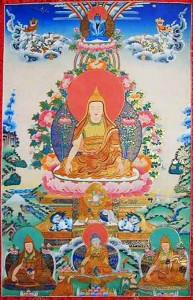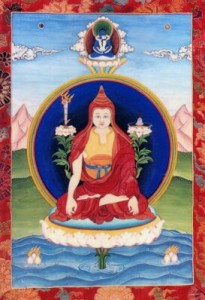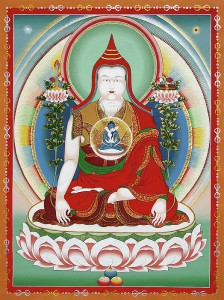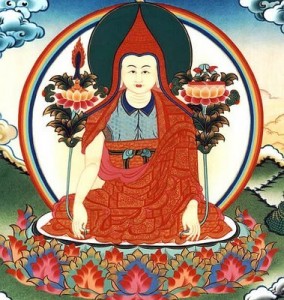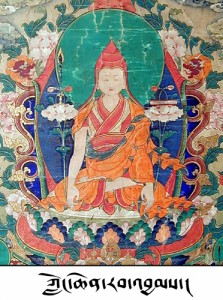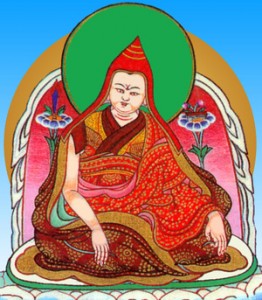The following is respectfully quoted from “Drops of Nectar” compiled by Ngagyur Nyingma Institute:
Vajra Song:
Instructions for Rousing Myself: Longchen Rabjam
Namo Guru Bhaya! Feeling truly wearied by the worldly experiences of myself and others, at Orgyen Dzong, I, “The Yogi of Various Kinds of Self-Liberation”, Longchen Rabjam (1308-1363), roused myself with this song of advice.
Chapter 1
Revealing the Hidden Faults
The great ship of the primordial wisdom of vast compassion
Liberates all beings without exception from the ocean of cyclic
existence.
I bow to the feet of the glorious protector, the sacred guru
Who has gone to the precious continent, peaceful and
immaculate.
The ocean of samsara is extremely difficult to cross;
With its raging waves of birth, old age, sickness and death.
It is hard to escape from the boundlessly deep.
To you confused ones who are floundering here I offer these
suggestions from my heart!
Without applying these suggestions to dig out hidden faults,
There will be no time to cast off all your unwholesome
behavior.
Without looking back into your inner mind,
There will be no time to see your negative faults.
Therefore, today I offer these suggestions from my heart!
Keep this in mind. It is beneficial spiritual advice.
Even if you live in solitude, you can become more accustomed
to depending on others;
If you are not free from the eight worldly concerns and the
distractions of this life,
You can become someone who appears to benefit others while
pervertedly benefiting himself.
Consider whether you can get by with such conduct!
By abiding in solitude, the Victorious Ones of the past attained enlightenment
And even former practitioners of the dharma achieved
accomplishment,
But you are completely distracted.
Consider whether you can get by with such conduct!
Not recognizing all material wealth, fame, glory, and valuable
possessions as magical illusions
And deceptive obstacles to accomplishment,
It’s like you are receiving something from one person and
giving it to another.
Consider whether you can get by with such conduct!
Not recognizing as manifold demons of distraction and illusion
All kinds of business with many different people,
you think that babbling platitudes about the dharma will
benefit others.
Consider whether you can get by with such conduct!
Being uncertain about exactly where you are heading,
You gather material wealth, build castles on dung heaps and so on.
Reckoning that you will live there forever, you take illusory
appearances to be real.
Do you think such conduct will suffice?
Failing to tame and stabilize your own mind,
But hoping to tame and stabilize the minds of others,
You will experience incessant suffering and torment.
Do you think such conduct is good enough?
Never applying yourself to the actual essence,
While day and night making great efforts for this life is a great mistake.
Such childish and imprudent ones are objects of the noble
beings’ smiles and laughter.
Consider whether you can get by with such conduct!
When a group of many aimless ones have gathered,
Distracted teachers and students fetter one another.
This is like making an aimless search for a guesthouse.
Clinging to never-ending appearances of magical illusion
As happiness and bliss, you lose the enlightened path to liberation
And feel no weariness toward cyclic existence.
Do you think such conduct is good enough?
This year is the dwelling ground of the Female Fire-Hog,
And twelve years from now will be the ground of the Male Iron-Dog, when
Foreign invasion is prophesied. Yet you make no effort to escape.
Do you think such conduct will suffice?
From all directions, war and strife will increase,
People will become intolerant and there will be many types of destruction,
But you are not trying to find the precious hidden land.
Consider whether you can get by with such conduct!
Even if you always perform good deeds without deceit,
Since there won’t be time to complete this, both inside and out,
The foundation of purposeless suffering will be uninterrupted.
Do you think such conduct is good enough?
Remaining in solitude in the mountains, but acting like you
were on the edge of a city,
Accustomed to countless meetings and gatherings,
You become completely careless and your occupations never end.
Consider whether you can get by with such conduct!
Although you mentally renounce this life, you cannot let it go;
Although you dismantle deluded ego clinging, it doesn’t fall apart;
Even remaining alone in the mountains, you’ll find no occasion for solitude
Do you think you can get by with that kind of conduct!
Although with words you talk about needing nothing, you
pursue food and clothing;
Although you speak of the impermanence of life, you’re still
not mindful of death;
Even remaining in solitude to practice, you’re still distracted by
entertainment.
Consider whether you can get by with such conduct!
Despite talking about the delusion of ordinary life, you chase
the eight worldly concerns;
Despite talking about the pointlessness of illusory appearances,
you still find a lot to do;
Although you say all things are equal, you maintain your partiality.
Do you think that kind of conduct will suffice?
Even if you sit down to accomplish the natural state, present
worldly concerns deceive you;
Even practicing the Dharma of your own free will, external
influences mislead you;
Whatever you do, day and night you are beguiled by illusion.
Consider whether you can get by with such conduct!
Although you ponder everything, this is not the essence.
Whatever you do lacks meaning and is a cause for suffering.
Abandon everything in an empty place without people.
If you could go today itself, this would be best!
Since there is nothing nearer than oneself,
I give this useful advice out of pity,
Listen, you virtuous-minded one who desires liberation!
If you heed these suggestions it will always be virtuous!
At the outset, the virtue is to abandon your present worldly activities.
In the middle, the virtue is to discard entertainment in solitary retreat.
In the end, the virtue is to achieve exhaustion in the natural state.
Ease in this present life and happiness in the future is the
intention of this advice!
I compose this advice by myself and for myself
To encourage others as well I offer this instruction.
It will be excellent if both others and I listen carefully!
Please pursue this excellent permanent aim from today!
From the Vajra Song of Instructions for Rousing Myself, this completes the first chapter of exposing one’s hidden faults.
